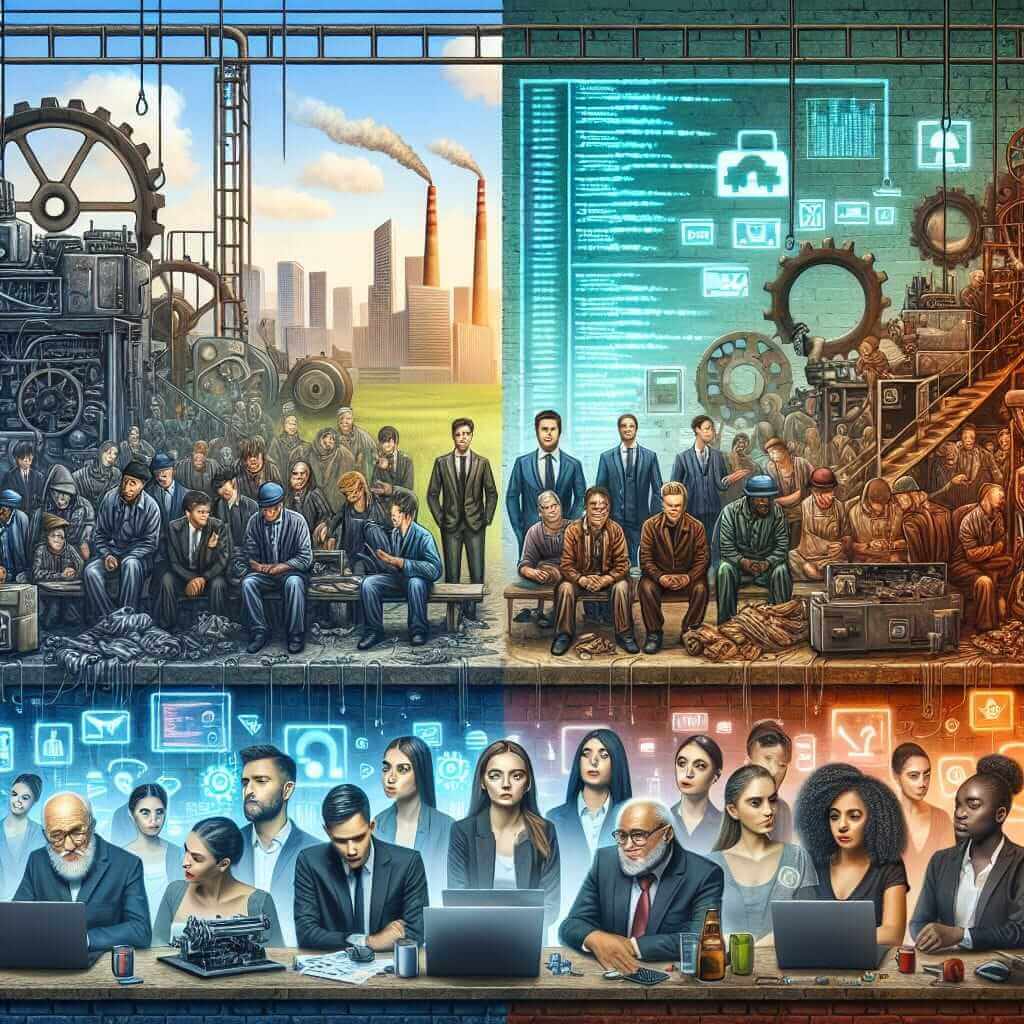The digital revolution has dramatically transformed economies and societies around the globe. This shift has profoundly impacted various aspects of our lives, particularly employment. This topic frequently appears in IELTS Writing Task 2, asking candidates to examine both the positive and negative effects that digital advancement has had on job markets. Exploring this topic can sharpen one’s ability to develop coherent arguments, use a wide range of vocabulary, and demonstrate a high level of grammatical accuracy.
Possible Essay Prompts:
- Discuss the positive and negative impacts of the digital revolution on employment.
- The digital revolution has changed the nature of employment dramatically over the past few decades. To what extent do you agree or disagree?
- Some people believe that the digital revolution has led to job losses, while others argue it has created more jobs. Discuss both views and give your opinion.
Main Content
Chosen Prompt:
Some people believe that the digital revolution has led to job losses, while others argue it has created more jobs. Discuss both views and give your opinion.
Analysis of the Prompt
This prompt requires a balanced discussion of both perspectives on how the digital revolution has influenced employment. You need to:
- Explore the argument that the digital revolution has caused job losses.
- Discuss the view that it has generated new employment opportunities.
- Conclude with your own opinion, substantiated by the discussed points.
Sample Essay
The advent of the digital revolution has sparked considerable debate regarding its impact on employment. While some assert that technological advancements have resulted in significant job losses, others contend that they have created a wealth of new opportunities. This essay will examine both views before presenting a reasoned opinion.
On one hand, the digital revolution has undeniably led to the diminution of certain jobs. Automation and artificial intelligence (AI), for instance, have supplanted many manual and routine tasks previously performed by humans. For example, assembly line jobs in manufacturing sectors have been drastically reduced as robots take over repetitive tasks. Moreover, industries such as retail have seen a decline in traditional roles with the advent of online shopping platforms and self-service kiosks. Consequently, workers in these sectors have faced displacement and the necessity to adapt to new skill requirements or face prolonged unemployment.
Conversely, the digital revolution has also paved the way for an array of new employment opportunities. The technology sector itself has burgeoned, offering myriad jobs ranging from software development to cybersecurity. Furthermore, the rise of digital marketing, e-commerce, and social media platforms has engendered roles that were non-existent a few decades ago. Indeed, the gig economy has flourished, providing flexible job prospects through platforms like Uber and Airbnb. These new realms of employment not only accommodate a diverse pool of skill sets but also foster innovation and entrepreneurial ventures.

In my opinion, while the digital revolution has undeniably led to the obsolescence of certain jobs, it has simultaneously served as a catalyst for job creation in emerging fields. The crux lies in the adaptability of the workforce to acquire new skills and transition into evolving industries. Governments and organizations should thus focus on retraining programs and educational reforms to equip individuals with the necessary competencies to thrive in a digitalized economy.
In conclusion, the digital revolution’s impact on employment is multifaceted, leading to both job losses and job creation. The key to harnessing its benefits lies in proactive measures to mitigate its adverse effects while capitalizing on the new opportunities it presents.
(Word count: 330)
Writing Tips:
- Lexical Resource: Utilize a wide range of vocabulary related to technology and employment. For example, terms like “automation,” “artificial intelligence (AI),” “displacement,” “gig economy,” and “cybersecurity” can enrich the essay.
- Grammatical Range and Accuracy: Employ various grammatical structures such as complex sentences and conditional clauses to enhance the essay’s sophistication.
- Task Response: Ensure the essay fully addresses all parts of the prompt and provides a clear, coherent argument.
- Coherence and Cohesion: Use cohesive devices effectively to ensure a logical flow of ideas throughout the essay.
Key Vocabulary:
- Automation (noun) /ˌɔː.təˈmeɪ.ʃən/ – The use of technology to perform tasks without human intervention.
- Diminution (noun) /ˌdɪm.ɪˈnjuː.ʃən/ – A reduction in size, extent, or importance.
- Displacement (noun) /dɪˈspleɪs.mənt/ – The removal of something from its usual place.
- Burgeon (verb) /ˈbɜː.dʒən/ – To grow or develop quickly.
- Obsolescence (noun) /ˌɒb.səˈles.əns/ – The process of becoming outdated or no longer used.
Conclusion
The digital revolution is a complex and evolving subject, especially concerning its impact on employment. For IELTS Writing Task 2, it is crucial to present a balanced argument, use a sophisticated range of vocabulary and grammatical structures, and ensure clarity and coherence throughout the essay. Practice with various prompts to enhance your proficiency and confidence in tackling such topics effectively.
Additional Practice Prompts:
- To what extent has the digital revolution affected unemployment rates around the world? Discuss with examples.
- How has the rise of remote working, driven by digital advancements, changed the employment landscape? Discuss the positive and negative aspects.
By understanding and addressing these questions, candidates can further enhance their writing skills and be better prepared for the IELTS Writing Task 2.